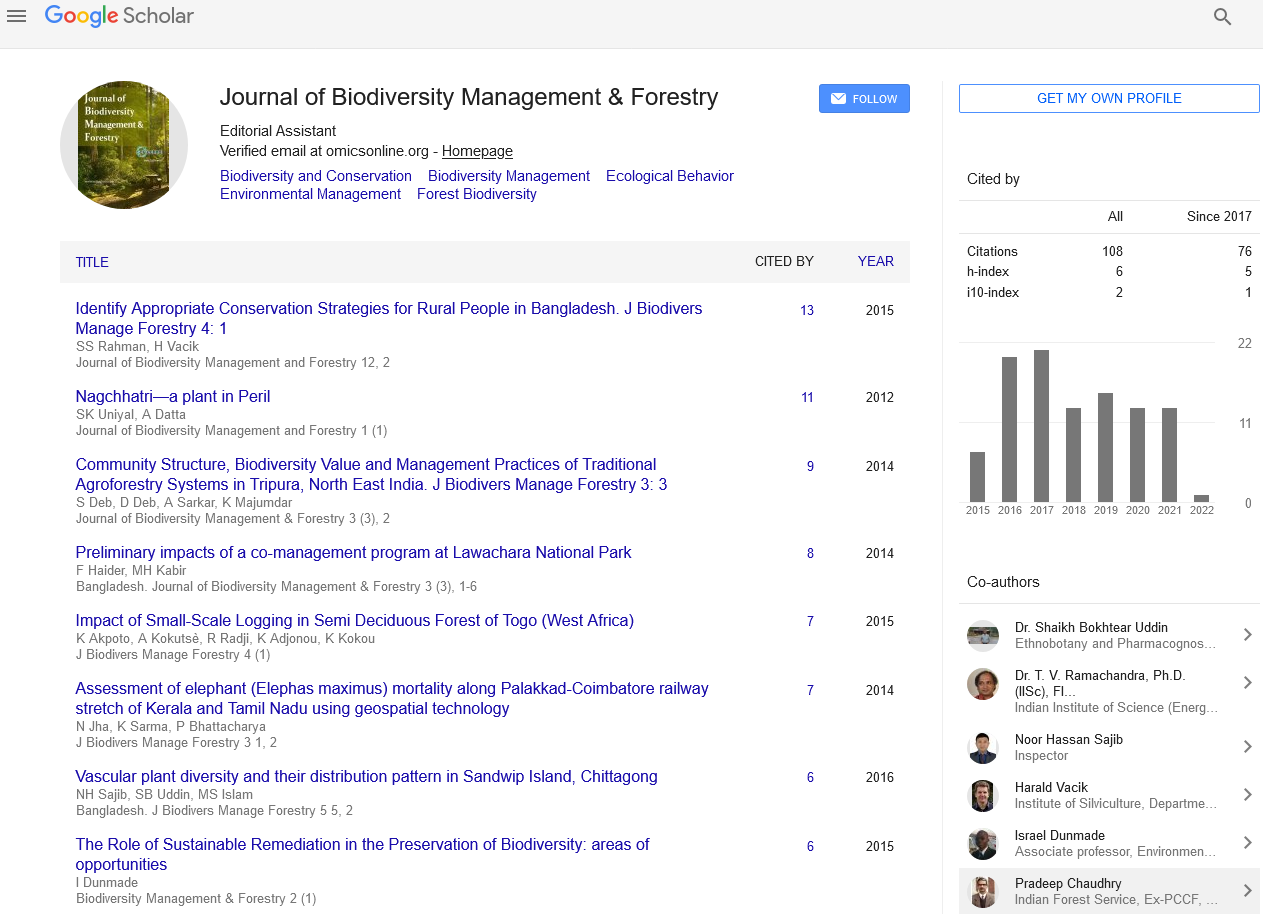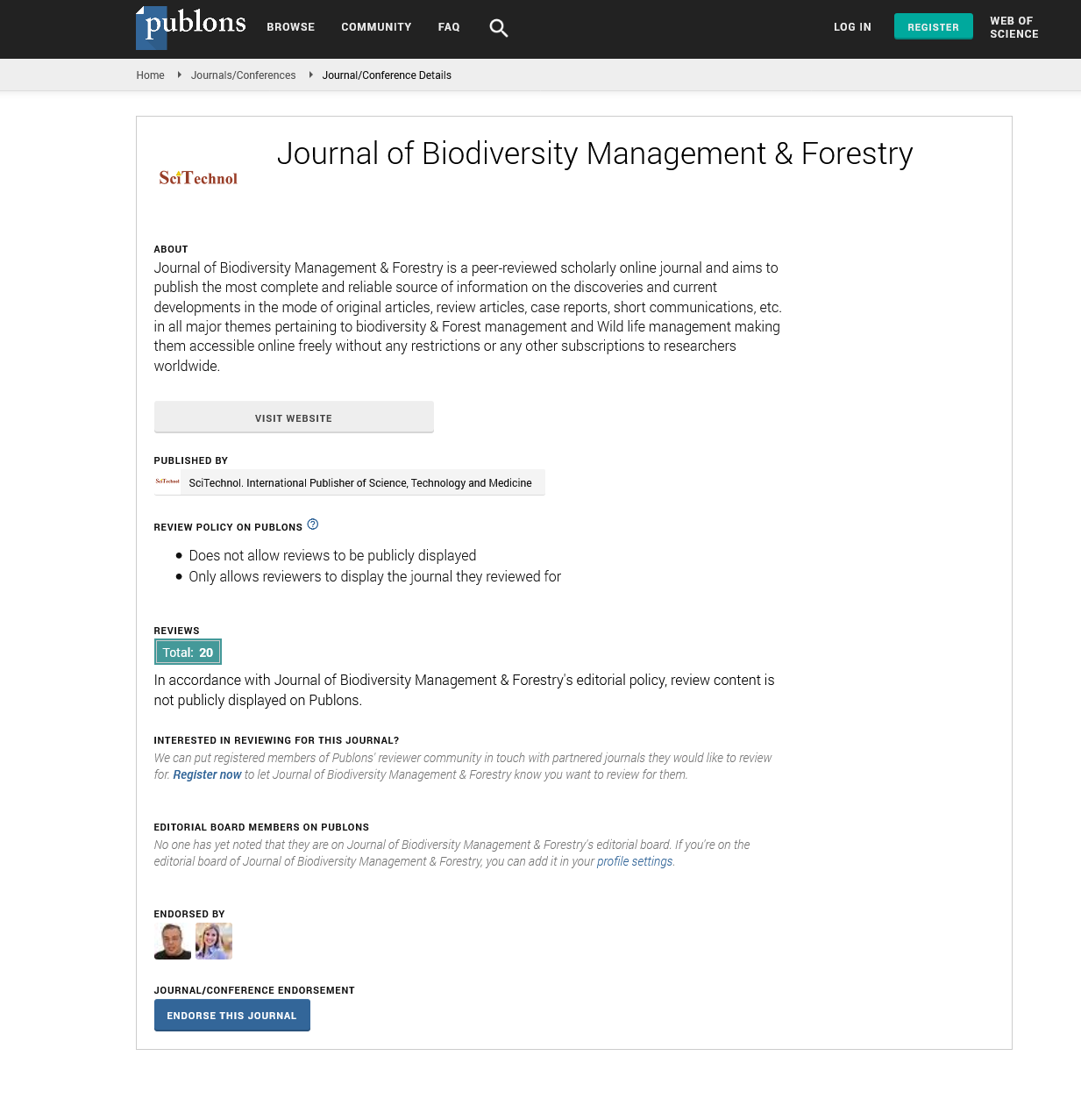Perspective, J Biodivers Manage Forestry Vol: 13 Issue: 4
Forest Management in the Era of Urbanization and Deforestation
Bruno Leite*
1Department of Forest Engineering, University Campus, Vicosa, Brazil
*Corresponding Author: Bruno Leite,
Department of Forest Engineering, University Campus, Vicosa, Brazil
E-mail: bruno.leite@ifmg.edu.br
Received date: 25 November, 2024, Manuscript No. JBMF-24-154576;
Editor assigned date: 27 November, 2024, PreQC No. JBMF-24-154576 (PQ);
Reviewed date: 11 December, 2024, QC No. JBMF-24-154576;
Revised date: 19 December, 2024, Manuscript No. JBMF-24-154576 (R);
Published date: 27 December, 2024, DOI: 10.4172/jbmf 2327-4417.1000071.
Citation: Leite B (2024) Forest Management in the Era of Urbanization and Deforestation. J Biodivers Manage Forestry 13:4.
Description
In today’s rapidly urbanizing world, forests are facing increasing pressures from both urban expansion and deforestation. Urbanization, characterized by the growth of cities, infrastructure and human settlements, has led to significant land-use changes, encroaching upon natural landscapes, including forests. At the same time, deforestation, driven by agricultural expansion, logging and industrial activities, continues to threaten forest ecosystems globally. Effective forest management in this era requires a dynamic, varied approach that balances the need for development with the importance of conserving and sustainably utilizing forest resources. This study discuss the challenges and opportunities of forest management in the context of urbanization and deforestation, highlighting innovative strategies for sustainability and conservation.
Urbanization has far-reaching implications for forest management. As cities expand, forested areas are increasingly being cleared to make way for housing, roads, industrial zones and other infrastructure. This not only leads to direct loss of biodiversity but also disrupts the ecosystem services that forests provide, such as carbon sequestration, water purification and climate regulation. Moreover, urbanization often increases the demand for wood and other forest products, exacerbating pressures on forests and driving illegal logging and landuse changes. In many urban areas, forests are fragmented into small patches, which makes them vulnerable to degradation. These fragmented forests are often unable to maintain their ecological functions effectively. For instance, they may lack the necessary genetic diversity or connectivity to survive in the long term. Forest management in this context needs to consider the dynamics of urban growth, taking into account the increasing competition for land, resources and ecosystem services. Another challenge posed by urbanization is the increased human-wildlife conflict. As cities encroach upon forested areas, wildlife species that once lived in these forests are forced into closer proximity with urban populations. This leads to human-wildlife interactions that can be dangerous for both parties. Additionally, the providing of infrastructure such as roads can create barriers for wildlife movement, limiting their access to essential resources. Deforestation is one of the most pressing global environmental challenges and its impact on forest management is deep. Driven by agriculture, logging, mining and infrastructure development, deforestation leads to the permanent loss of forest cover, reducing biodiversity and releasing significant amounts of carbon into the atmosphere. The loss of forests contributes to climate change, disrupting the global carbon cycle and exacerbating climate-related risks, such as flooding, droughts and soil erosion.
In the era of urbanization, deforestation is often linked to the expansion of agricultural lands to meet the demands of growing populations. As more land is cleared for crops and livestock, the natural habitat of forests is destroyed, making it difficult for species to thrive. Unsustainable logging practices also contribute to the depletion of forest resources, particularly in tropical regions, where the destruction of primary forests has reached alarming rates. Given the challenges posed by urbanization and deforestation, forest management practices must evolve to ensure the long-term health and productivity of forests. Several strategies can help reduce the impacts of urbanization and deforestation while promoting sustainable resource use. Urban forests, also known as city forests, play an important role in maintaining the ecological balance in urban environments. Urban forests are composed of parks, green spaces, street trees and natural reserves within city boundaries. They provide valuable ecosystem services, including air and water purification, temperature regulation and recreation opportunities for city dwellers. Effective urban forest management requires a broad approach that integrates trees and green spaces into urban planning and development. Policies should focus on the sustainable management and expansion of urban green spaces, ensuring that they are protected from overdevelopment and degradation. Additionally, urban planners can incorporate green roofs, vertical gardens and green infrastructure into building designs, allowing cities to maintain natural landscapes even in densely populated areas.
Forest management in the era of urbanization and deforestation requires a multifaceted approach that integrates sustainable practices, innovative strategies and effective governance. As cities expand and forests continue to face degradation, it is essential to balance the demands of urban development with the need for forest conservation and restoration. By adopting strategies such as urban forest management, reforestation, integrated land use planning and sustainable logging, we can ensure the long-term health of forests and the continued provision of evaluative ecosystem services. Through global collaboration, strong policies and innovative management practices, forests can continue to play a vital role in supporting biodiversity, reducing climate change and providing resources for future generations.
 Spanish
Spanish  Chinese
Chinese  Russian
Russian  German
German  French
French  Japanese
Japanese  Portuguese
Portuguese  Hindi
Hindi 
